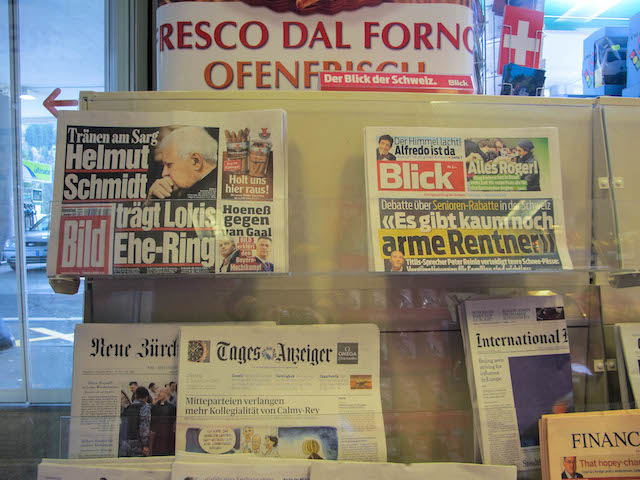You’ve heard it all before. Print is dead. So commonplace is the refrain, it’s practically meaningless. Particularly given the fact that it’s been continuously restated for nearly two decades, now. Print lives, albeit as one of two mediums, to deliver news.
At best, such statements can be read as declaring the death of print’s monopoly over readable media. Considering how many specialist periodicals continue to thrive, as newsstand publications, perhaps a better way of saying it is print is niche.
Still, the transition to digital, which the ‘dead’ designation refers to, is not pretty. It has very real consequences for labor – not just unemployed journalists, who are entertaining the idea of being copywriters for financial services, or communications specialists, but those who physically produce magazines and newspapers. Those working in the printing industry are just as much at risk. The Zurich flyer translation below, provides one such example.
Recounting a situation typical to many crisis-hit industries, printers are forced to work longer hours, while the value of what they produce (see the Swiss newspapers in the first photo) declines. Mention is made of the economic crisis, which Switzerland is supposed to have avoided. Not in this instance. When talking about the decline of print, it’s often assumed that the process is evolutionary, as though digital publishing its news’ natural format, absent any other considerations which might be ushering in the death of physical media. Like recessions, for example, and the fact that news periodicals have become unaffordable.
Next time you hear another TED talk-type proclamation of this sort, consider examples like this, and how they complicate matters It’s possible that hegemony of the digital is as much about the economy as it is progress.

Roter motoR 32
Massive breakdown of the collective labor agreement…
Soon, printers who do not work in a newspaper printing plants will have to work 42 hours instead of 40. For employers this is a “historic breakthrough” which does not happen often in an entire industrial sector. Both the Syna and Syndicom trade unions understand the effects of the economic crisis and the increasing loss of rates for employers of the printing industry. There are those who agree to this, and there are all the rest.
In the printing plant…
Clearly the printing industry is not the economic area from which capitalists can draw the biggest profits. Therefore, every year hundreds of jobs are lost in the sector in Switzerland. This produces powerlessness and paralyzes the fighting spirit. Who wants to go on strike if you have a knife against your throat anyway? This fear is deliberately used by bosses and improvements in collective labor agreements are pitted against the threat of closure and relocation. And yet they are still fighting! Both the workers at the Basler Zeitung and Ziegler printers in Winterthur have shown through industrial action that even in such a precarious situation, resistance to degradation and poor working conditions is possible. They have set an example, which affects both the entire industry, as well as other sectors of the economy.
Class struggle instead of submission!
There was a strike in Spar, a Swiss retail chain, which the state ended by threat of police violence. It made certain things clear: the crisis did not just bring factory closures and the fear of redundancy. It also brought awareness of who works and who benefits from this work. In contrast to the Syna and Syndicom unions, we do show compassion for the bosses’ loss of profits. This is because our interests are incompatible with those of the bosses. The main capitalist principal can only be undone in a social formation where goods are produced and distributed according to our needs.
Labor struggle instead of labor peace!
For Communism
Translated from the German by Kit Rickard. Photographs courtesy of Joel Schalit.





